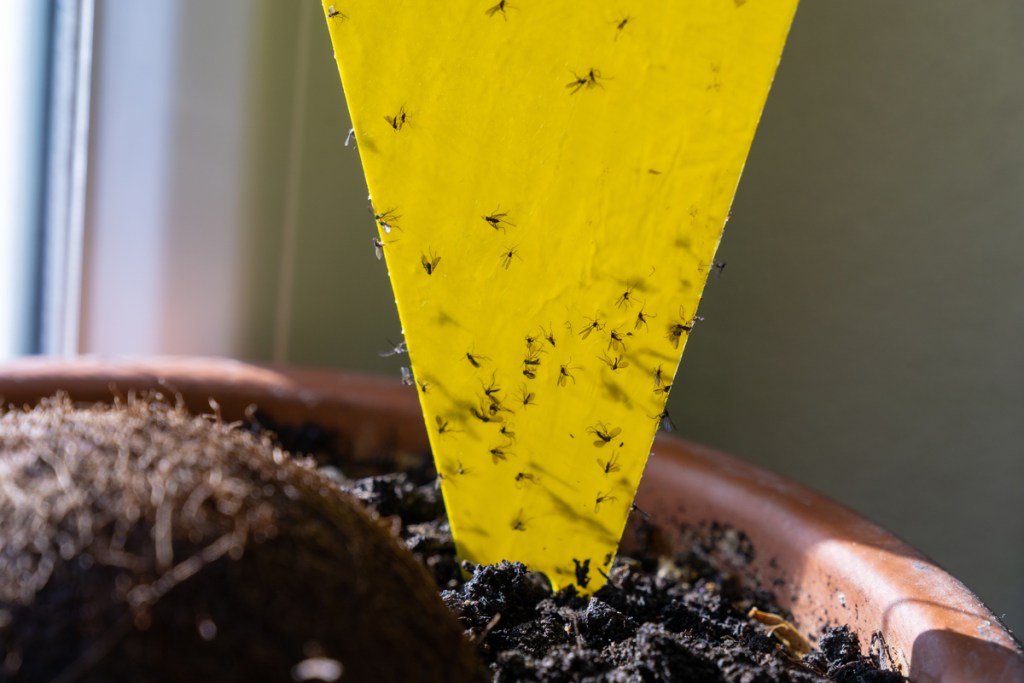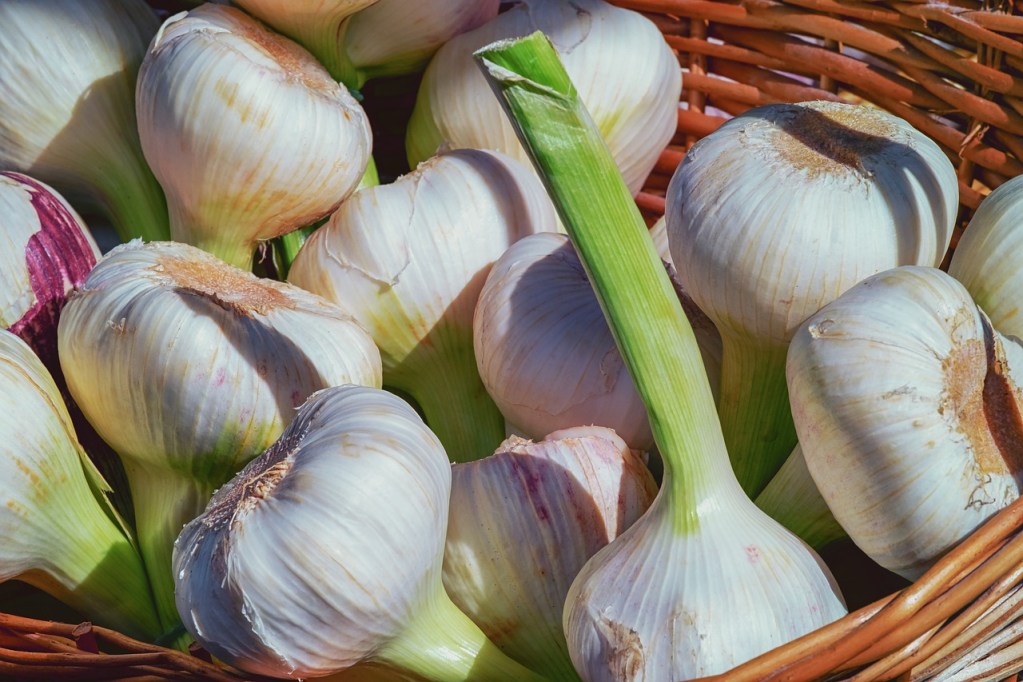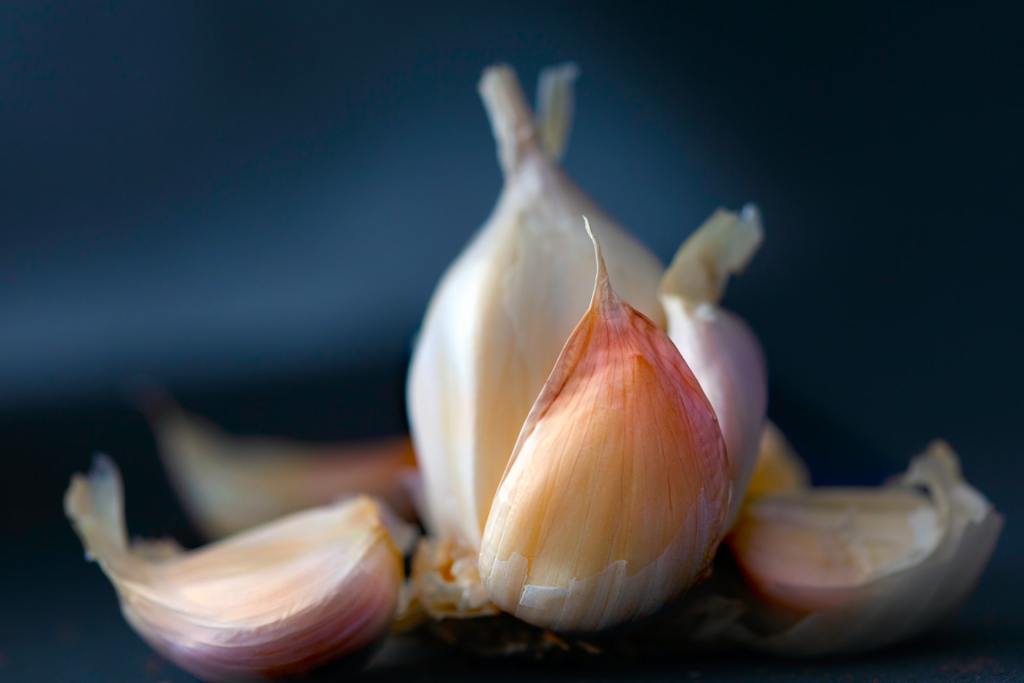Gardening is one of the best ways to beat stress and get in touch with nature. The problem is that cultivating plants sometimes leads to different kinds of stress: pests. When it comes to pest removal, gardeners have plenty of options at their disposal, from simply letting nature run its course to introducing predatory species that can help reduce pest pressure. Many choose to apply insecticides and pesticides, either organic or more heavy-duty chemical solutions. When pest pressure is highest, spraying may be the only option to save the plant.
But spraying for bugs doesn’t have to mean handling toxic chemicals. Natural products, such as garlic essential oil, can be helpful tools for dealing with pest pressure in a nontoxic way. If spraying plants with plant juice to save them from hungry bugs sounds like a questionable practice, keep reading. We’ll explore the effectiveness of garlic insecticide and identify what pests garlic spray might help keep away.

Does garlic insecticide really work?
Scientific studies of garlic as an insecticide date back to the early 1970s, and anecdotal evidence goes back much further. Early research supported claims of garlic’s effectiveness as a non-toxic control for both larval and adult mosquitoes. Traditional agriculture experts and scientists agree that garlic spray can be an effective insect killer and deterrent.
Garlic essential oil and its naturally occurring constituents, diallyl disulfide and diallyl sulfide, are the keys to its effectiveness. In lab tests, these sulfur compounds interfere with the insect’s sensory receptors, causing disorientation and death at all life stages for a wide variety of flying and crawling bugs. In the garden, sensitive bugs tend to simply stay away from treated plants, but those that are present at the time of application will be killed.

What pests does garlic spray keep away?
The irritating and disorienting sulfur compounds in garlic repel most flying and crawling insects. It’s especially helpful against annoying aphids, armyworms, beetles, caterpillars, cutworms, mites, mosquitoes, and flies.
Garlic repels many larger pests as well. If you have problems with deer, mice, moles, or rabbits in the garden, a few well placed drops of garlic essential oil or a garlic-based repellent may help steer your unwanted garden visitors in a different direction.

How to use garlic insecticide
Garlic insecticide is available for purchase from garden suppliers, or you can try making your own. When using a commercially available garlic insecticide, follow the manufacturer’s handling and application instructions as shown on the product label.
As a non-targeting insecticide, garlic spray also has deterrent or harmful effects on beneficial insects. For this reason it is important to use it in a way that will minimize collateral damage. For instance, do not spray if no pest insects are present or causing damage. If damaging pests are present, spray in the early morning or later in the evening when the pests are present and active. Finally, target the pest’s hiding places by spraying on the undersides of leaves and along plant stems.
Homemade garlic bug spray recipe
Materials:
- Blender
- Cheesecloth
- Quart jar with a lid
Ingredients:
- 3 garlic bulbs
- 1 quart of water
- Liquid dish soap
Directions:
- Separate the garlic cloves. Leave the skins on the cloves. Discard excess wrappers.
- Place all of the cloves into the blender and add a cup of water.
- Put the lid on the blender and pulse until the cloves are well chopped.
- Add the rest of the water and four drops of liquid dish soap.
- Put the lid on the blender and thoroughly liquefy the mixture.
- Filter the mixture through the cheesecloth to remove all non-liquid particles, then transfer the mixture to the quart jar.
The resulting mixture is concentrated. To use the spray, dilute one part concentrate with 10 parts water. Apply on or around plants with a trigger spray bottle.

The downside of using garlic spray
While garlic is effective against many annoying and damaging bugs, and while it has no toxic effects on mammals, fish, or birds, it does present some challenges. Those with smaller yards and gardens will note the strong aroma after application. Even if that’s okay for you, your neighbors may object.
Another possible mark against garlic is that its effectiveness is reduced during rainy spells. While that’s true of any topical, non-systemic insecticide, it still bears mentioning here. If a storm is coming, it’s best to apply the treatment after the bad weather passes.
Also, as effective as garlic may be against many different kinds of bugs, some species will remain out of reach. Active borers, leaf miners, ants, and other pests that live inside the plant tissue or below ground are not really susceptible to the volatile compounds due to the physical barriers involved. In these cases, other treatments would be better.
Editors' Recommendations
- 3 incredible reasons why you should be using coffee grounds in your garden
- The truth about holly leaves – interesting facts you might not know
- What you need to know about electric garden fences
- You should never use ladybugs as pest control – this is why
- How often should you turn your compost pile? What you need to know




